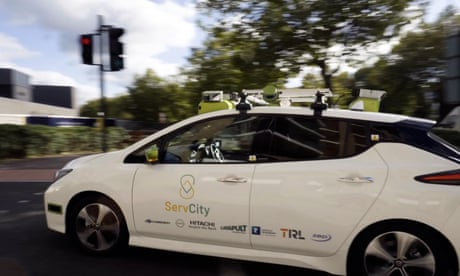- by theguardian
- 21 Sep 2023
�It�s a long-term journey we�re on�: taking a ride towards self-driving cars
�It�s a long-term journey we�re on�: taking a ride towards self-driving cars
- by theguardian
- 18 Feb 2023
- in technology

The journey in a self-driving Nissan across Woolwich in south-east London begins smoothly enough: fitted with cameras and sensors, the electric car confidently handles pedestrian crossings, vans cutting into its lane without warning and even scurrying jaywalkers.
Then comes an unexpected obstacle: a football-sized rock, fallen from the back of a lorry on to the middle of the road. The specially trained safety driver hastily grabs the steering wheel, taking back control to avoid a nasty crunch.
It is hardly a major incident - and it is the only human intervention during five miles of navigating busy traffic in a demonstration of the ServCity research programme being carried out by the carmaker and partners in London. Nevertheless, it highlights the difficulties facing autonomous driving technology before it can become mainstream - particularly on Britain's busy and often chaotic urban roads.
"It's a long-term journey we're on," says Matthew Ewing, Nissan's vice-president for vehicle engineering in Europe.
Hands-free driving is still banned in the UK, although the government last summer pledged to allow the first self-driving cars on British roads by 2025. Carmakers are racing to develop the technology to be able to launch driverless taxis and eventually personal vehicles that can travel anywhere without human input.
Every large automotive company is looking ahead to autonomous cars, while startups such as the Alphabet-owned Waymo and the General Motors-owned Cruise have also invested heavily. Cruise has driven paying customers in driverless "robotaxis" in San Francisco, Phoenix and Austin in the US. In London, autonomous car trials have been carried out by the startups Oxbotica, Wayve and the Academy of Robotics.
The ServCity project, which has received £7m from the UK government and is drawing to an end next month, is looking at ways to improve performance in cities in particular. The project has driven 1,600 miles on a 2.7-mile route around Woolwich with 270 cameras plus other sensors. They allow the team to collect data, but also to experiment with features such as giving the car advanced warning of obstacles including parked buses blocking the lane ahead - even when well beyond the line of sight.
- by travelpulse
- descember 09, 2016
Resort Casinos Likely Scuttled Under Amended Bermuda Legislation
Premier announces changes to long-delayed project
read more





